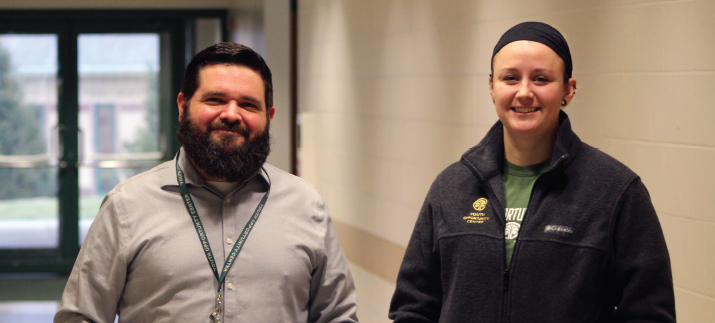
03 Mar A Trauma-Informed Toolkit
100% of the residents at the Youth Opportunity Center have experienced some form of trauma in their young lives—many having experienced sustained or repeated complex trauma. For most, that means the trauma was not a single event, but rather a series of traumatic events or circumstances. Whether witnessing the overdose of a loved one, observing or receiving sustained physical abuse or neglect, or experiencing sustained violence or drug abuse—our residents come from deeply traumatic life circumstances.
Clinical treatment is one of the most crucial elements of a child’s time here at the YOC. Mental health staff at the YOC have adopted a trauma-informed approach to their treatment of our residents, but it doesn’t stop there. As part of a multidisciplinary approach to healing and recovery, all programs and activities on campus have adopted a trauma-informed approach—including our recreation and ministry programs. Understanding a bit more about the trauma-informed approach will help us explore just how and why our ministry and recreation programs are such a complementary tool within each child’s healing.
According to SAMHSA (Substance Abuse and Mental Health Services Agency), “a trauma-informed approach is distinct from trauma-specific services or trauma systems. A trauma-informed approach is inclusive of trauma-specific interventions, … [but] also incorporates key trauma principles into the organizational culture.” For instance, a trauma-informed approach will intentionally work to prevent re-traumatization of victims. Policies and procedures will be in place to prevent this from happening and derailing recovery. For instance, “using restraints on a person who has been sexually abused or placing a child who has been neglected and abandoned in a seclusion room may be re-traumatizing and interfere with healing and recovery” (SAMHSA’s Concept of Trauma and Guidance for a Trauma-Informed Approach, July 2014).
So, how does this approach apply to ministry and recreation? We talked with the YOC’s Spiritual Life Coordinator, Paul Ward and Recreation Coordinator, Kendi Zvokel about how they use trauma-informed principles in their work, and the impact that has had on residents’ success and healing.
“What I’m doing with these kids is always guided by the principles of trauma-informed care,” Ward shared. “I let those principles direct how I minister, how I shape my discussions with the kids and ultimately that aligns what I’m doing with the YOC’s overall treatment approach.”
Ward understands the challenges of ministering to victims of trauma. As a former Air Force Medic, he has witnessed the toll of both physical and mental trauma. He also understands that trauma impacts the way in which the victim may receive his message. “In ministry, when we realize that someone has been a victim of significant trauma, we usually want to fix things,” he says. “But fixing things for these kids is often not possible in the moment—that’s not my job. I’m not qualified to do the fixing. What I can do is walk alongside them, let them know they’re not alone. This lets my message be heard, and opens the door for the fixing to occur by those who are qualified. I’ve found this approach best supports clinical treatment efforts and our residents’ overall success here.”
While there are no specific trauma-informed ministry certifications, Ward spends a great deal of time diving into trauma-informed research, constantly familiarizing himself with best practices and how he can incorporate those into his ministry efforts. He maintains a network of peers in his field with whom he can discuss his trauma-informed approach, and offer the most effective ministry services possible. While Paul Ward can be seen leading weekly Bible studies and church services, and providing one-on-one spiritual counseling, Recreation Coordinator Kendi Zvokel can be found in the gym, out on the soccer field in our “Back 40” or spending time in our incentive-based “store,” Pillar Pointe. While the activities they lead may look very different, Zvokel is another staff member using a trauma-informed approach in all she does.
Zvokel recently attended a coach training conference led by Up2Us Sports. In this training, Zvokel honed her skills in trauma-informed coaching—learning not only the importance of recreation in helping kids cope with complex trauma, but understanding how her approach to coaching can complement clinical treatment by preventing re-traumatization and fostering a safe, supportive environment.
“In this training,” Zvokel said, “We learned about the impact physical activity has on the brain. It literally makes your brain more prepared for stress, helping rewire the stress response. More physical activity equals more time to practice controlled stress. So, physical activity really can be the key to addressing trauma by giving these kids the tools they need to be productive in their clinical treatment sessions.”
Not only does the act of engaging kids in physical activity help promote healing from trauma, but the approach Zvokel takes in her coaching is key as well. Her training in trauma-sensitive coaching strategies taught her about observing and understanding behaviors to asking calming questions, providing praise and more. “Ultimately,” she says, “trauma-informed coaching is about using physical activity to give kids what they need, to help them feel supported and to calm their stress and need to protect.”
Both Ward and Zvokel understand their roles in supporting the kids’ best chances for success in their clinical treatment. The goal with every activity on campus is to provide our residents with the tools and mechanisms they need to overcome their traumas and set their lives on a better path – a path to success and to achieving their dreams.
“Trauma-informed principles open the door to dealing with the whole person,” Ward said. “And that’s ultimately what we’re all striving for here at the YOC, to provide holistic healing for each child so that their trauma doesn’t define their life.”


